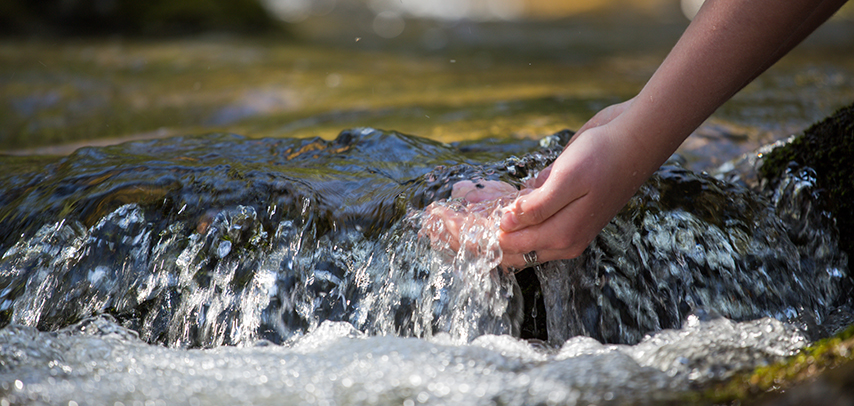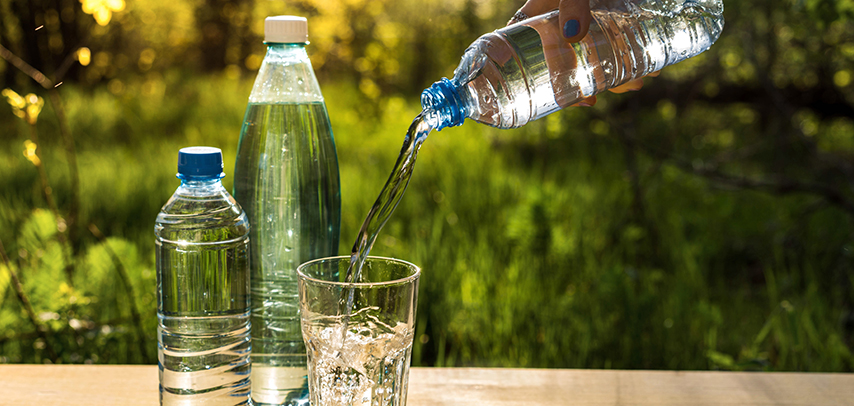Drinking sufficient amounts of water every day is undoubtedly the most basic, simplest and cheapest way to maintain a healthy lifestyle. Just as we cannot breathe without oxygen, we cannot survive without water, either. Although it varies by our age, weight, height and physical activity, our body consists of 50 to 70% of water. Each cell, tissue and organ in our body needs to maintain this ratio to function properly. Water ensures a proper blood circulation and carries the toxins out of the body.
When we do not have sufficient water in our body to perform normal functions, we are “dehydrated”. Even a light dehydration can take away our energy and make us feel depleted. If you often feel tired or hungry, or have frequent headaches or digestive problems, your body might be asking you for more water.
How much water is recommended for a healthy lifestyle? Although it sounds like an easy question, the answer varies. Your need for water changes based on many factors, such as your health, age, height, weight, the climate you live in, and your physical activity. A single formula may not fit all, however being more informed on your body’s need for water will increase your awareness and help you calculate the accurate amount you need to consume in one day.
What are the benefits of water?
- Regulates body temperature.
- Increases blood volume, which helps faster transportation of oxygen and nutrients to the cells and maintains heart health.
- Protects against digestive problems, such as constipation and lazy bowel syndrome.
- It soothes.
- Helps nursing mothers produce more milk.
- Supports the immune system while fighting against contagious diseases, such as the flu.
- Plays a major role in maintaining skin health. People who drink sufficient amounts of water have hydrated, radiant skin that looks healthy and young.
- Helps get rid of oedema.
- Helps body metabolism to function properly and quickly. Supports weight loss.
- Protects against kidney diseases.
- Prevents muscle spasms and cramps during exercise.
How much water should we drink?
The amount of water we need changes depending on our age, weight, the climate we live in, our diet, and physical activity. The recommended water consumption for one day varies between 30 to 50 ml. For adults, this would equal 2 to 3 liters. Children between the ages of 4 and 8 are advised to drink 1 to 1.5 liters of water, children between 9 and 13, 1.5 to 2 liters, and children between 14 and 18, 2 to 2.5 liters of water per day
Don’t wait to feel thirsty to drink water!
Throughout the day, we get liquids into our body by consuming drinks like milk, tea, and juice, but it should be remembered that these drinks cannot replace water. The feeling of thirst appears when our body needs water, however we need to replenish our water before our body gives alarm signals. Because children and the elderly feel thirst less strongly than adults, they often need to be reminded to drink water.
When should we drink water?
Drinking water when we wake up, before breakfast, 30 minutes before and 2 hours after lunch and dinner, and 2 hours before going to bed helps digestion, soothes the stomach, helps us take in less calories and control our weight and regulates our body temperature. However, because drinking water late at night might disrupt our sleeping schedule, it is not advised to drink water if you wake up from sleep in the night.
How do know when you need water?
When you do not have enough water, i.e., you are dehydrated, your body signals this in many ways. These signals can be mild or strong depending on the severity and duration of your liquid loss. Headaches during the day, constant hunger even when you are full, constipation, difficulty concentrating, fatigue, feeling depressed for no reason, sudden mood changes, darker colored urine, and forgetfulness are some of the signs of dehydration.
Is it harmful to drink too much water?
Anything we consume more of than what we need is harmful. Even though we need it to survive, water is no different. Consuming more than we need or excessive amounts of water can cause problems that affect our daily lives and our health negatively.
- Drinking too much water can cause nausea and vomiting.
- It can make you feel bloated, as if you have eaten everything on the dinner table.
- Drinking too much water after eating salty foods causes oedema. When the sodium levels in our body go up, we drink more water. This causes swelling, particularly in hands and feet.
- Too much water can cause headaches, tension and confusion. It can also trigger double-vision, difficulty breathing, increased blood pressure and numbness.
- When we drink too much water, the electrolytes in our body decrease, which can cause cramps and muscle spasms.

Is it beneficial to drink hot or lukewarm water?
Drinking warm water can aid digestion and help your body get rid of toxins easier by supporting blood circulation. However, because drinking lukewarm or hot water might make you feel thirsty, it would be risky to do in hot weather or when sweating excessively.
Is it beneficial to drink water on an empty stomach?
Starting the day off with a glass of water helps us replace the water we lose at night in producing urine and sweat, through breathing and other bodily functions.
Drinking water before each meal can help us take in less calories. This is because the water we drink can fill our stomach beforehand and make us feel full. Research shows that drinking water before meals decreases calorie intake by approximately 13% per meal.
Another benefit of drinking water on an empty stomach is that it regulates bowel movements. Drinking lukewarm or hot water will stimulate the bowels more effectively.

What should we do if we have difficulty drinking water?
Although water is one of the basic needs of our body, it is well known that many people have difficulty drinking water regularly, particularly because they don’t enjoy the taste. If you also have this problem, you should try out different brands of water and choose the one that suits you best. In fact, water itself does not have any taste, but the minerals found in the spring where the water comes from give it a certain taste. For that reason, trying out new brands of water or adjusting water temperature might make it easier for you to drink water.
How can you build a habit of drinking water?
By taking these small but effective steps, you can build a habit of drinking water.
- Carry your water wherever you go.
- Drink water before and during meals.
- Make a habit of drinking a cup of water when you wake up.
- Monitor your water consumption using an app on your phone. Use apps to remind yourself to drink water.
Does drinking tea, coffee, herbal teas or juices during the day provide enough water for us?
Unfortunately, even if the drinks we consume during the day satisfy our body’s need for liquids to some extent, nothing can replace water or provide the same benefits. When we do not drink enough water and get dehydrated, our body cannot function properly. With the diuretic effects of tea, herbal tea and coffee, our body loses more liquid, which then causes oedema. Fruit juices contain sugar and additives and therefore create an additional calorie intake. For all these reasons, we should remember that no liquid can replace water.
You May Be Also Interested